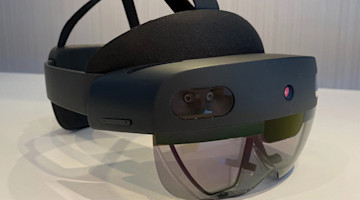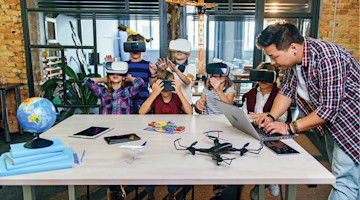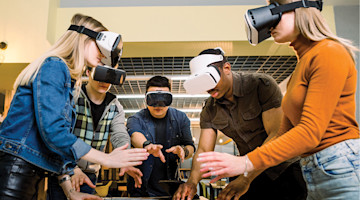How can manufacturing technology companies find potential partners and other resources to advance their capabilities to develop innovative new products and technologies cost effectively? You don’t need to go it alone and hire all the expertise you need in-house. There are many regional, state, and national organizations and resources that can help. In this article, I’ll provide an overview of the key organizations AMT recommends you contact as a starting point.
There are two key types of resources to investigate: national organizations focused on fostering public-private partnerships, specifically Manufacturing USA institutes and the Hollings Manufacturing Extension Partnership (MEP) Program, and regional colleges and universities in your state.
Partnerships are a strategic way to determine the feasibility of a solution or to obtain resources to help scale it, commercialize it, or integrate it successfully into a production environment.
MANUFACTURING USA
Manufacturing USA is a group of linked manufacturing institutes focused on a distinct element of advanced technology and tasked with a mission to advance that technology. Each institute provides both resources and coordination in a knowledge domain to its members, and there are currently 14 institutes throughout the United States. Although they are located in specific cities, each institute has a national scope and outreach.
The institutes focus on advanced technologies relevant to manufacturing, many of which are directly related to manufacturing materials, infrastructure, or process optimizations. Areas of concentration include additive manufacturing, advanced robotics for manufacturing, advanced composites manufacturing, digital design and manufacturing, and lightweight materials.
Each institute enables industry, university, and government partners to collectively leverage existing resources, collaborate on projects of mutual interest, and co-invest to nurture and advance manufacturing innovation and manufacturing technology commercialization.
HOLLINGS MANUFACTURING EXTENSION PARTNERSHIP PROGRAM
The Hollings Manufacturing Extension Partnership (MEP) Program is another resource. It specifically focuses on providing resources to small- and medium-sized businesses. MEP has centers in all 50 states and Puerto Rico (larger states have multiple MEP centers). Each state MEP is built around its partnerships. Centers connect manufacturers to national and state government agencies and resources, trade associations, universities, research laboratories, and potential business partners.
Each respective state center tailors its resources and services to meet critical needs in that state. Although not exclusively focused on manufacturing technology, services supporting the advancement of MT are available in most states. They include supply chain integration, market and product development, facility expansion, technology transfer, process improvement, workforce development, and training.
For example, Manex, the MEP for Northern California, provides training programs designed for manufacturing, distribution, and supply chain companies. These programs address product development and innovation, supply chain development, export assistance, technology transfer using area labs and universities, and connecting manufacturers with private and public resources.
TechSolve, the MEP for Ohio, leverages its partners and expertise in machining and manufacturing to help bring emerging technologies into a larger number of manufacturing environments. Services include implementation of connectivity solutions for company manufacturing platforms.
North Carolina has a slightly different model. Its MEP is a network of six organizations that work collectively as an alliance.
UNIVERSITY PARTNERSHIPS
Partnering with and leveraging the resources and programs of universities in your home state is another avenue for advancing your company’s MT solutions. Universities can be regional or national in reach, public or private, and four-year or two-year. Large universities, especially, often function as national research hubs with dozens of large research projects going on at any given time. Engineering and technology departments have research programs, laboratories, or entire institutes working on manufacturing technology projects, and may offer partnership opportunities and other valuable free or low-cost resources. Purdue University and the University of California, Berkeley are just two recent examples of university-industry partnerships at work.
Purdue currently has more than 100 faculty and more than 500 graduate students doing research related to manufacturing technology. It also hosts the Indiana Manufacturing Competitiveness Center (IN-MaC) delivered in partnership with two other universities, the goal of which is to advance and support growth of MT in the state and help regional SMB manufacturers make the transition to Industry 4.0.
“Indiana has a large number of Tier 1 and 2 companies that form the supply base of large OEMs in various industry sectors. IN-MaC provides resources that help them with many of their challenges including investment in research, sharing research laboratory expertise, and technology transfer into the private sector,” said Nathan Hartman, co-executive director, IN-MaC and Dauch Family Professor of Advanced Manufacturing at Purdue. “Purdue has also launched an innovative Intelligent Manufacturing Testbed, a 14,000 sq. ft. ‘research factory,’ the purpose of which is to demonstrate the digital twin and the smart factory in an industrial environment and provide technical expertise and production capacity for Indiana companies to scale products.”
All Indiana-based manufacturers are eligible for IN-MaC services which include education, workforce development, and training spanning K-12 through executive leadership programs—a variety of STEM-type, skilled trades, and degree (associates and undergraduate) and certificate programs.
Purdue also supports regional manufacturing companies through its Wabash Heartland Innovation Network (WHIN) program, a 10-county consortium that works with regional manufacturers to develop and implement technologies and provide workforce education and development.
On the west coast, UC Berkeley will soon be launching a major statewide initiative on workforce training for smart manufacturing. “Advanced manufacturing requires a workforce with the ability to work with data, models, analytics, and systems and to integrate sensors, cameras, and robotics into manufacturing enterprise systems,” said Tarek I. Zohdi, Chancellor’s Professor and Will C. Hall Family Endowed Chair, Department of Mechanical Engineering, UC Berkeley. “Our comprehensive training program spans community college through postdoctoral training, includes training for the incumbent workforce, and builds a pipeline that extends into K-12. The program will address multiple modes of delivery, both onsite through workshops, boot camps, and industry sites as well as online through self-directed learning, simulation, and virtual reality learning. UC Berkeley will create and distribute stand-alone training modules that combine extensive online instruction and a network of onsite residential boot camps. The team will work with educational institutions and industry partners throughout California.”
AMT has relationships with dozens of universities throughout the country and is an excellent resource to get you pointed in the right direction as you start the process.






